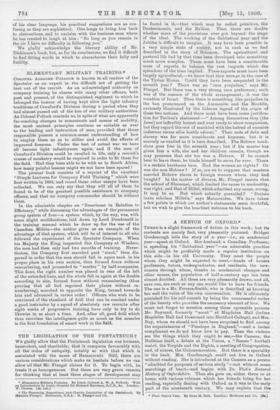ELEMENTARY MILITARY TRAINING.* COLONEL ALSAGER POLLOCK is known to all
readers of the Spectator as an expert in the difficult art of getting the best out of the recruit. As an acknowledged authority on company training he shares with many other officers, both past and present, of the distinguished regiment to which he belonged the honour of having kept alive the light infantry traditions of Craufurd's Division during a period when they bad almost passed out of the ken of our military authorities. As Colonel Pollock reminds us, in spite of what are apparently far-reaching changes in armaments and means of mobility, the most ancient principles continue as suitable as ever to the leading and instruction of men, provided that those responsible possess a common-sense understanding of how to employ them so as to utilise and avoid the effects of improved firearms. Under the test of actual war we have all become light infantrymen again, and if the men of Craufurd's Division could be recalled to life, only a recruit's course of musketry would be required in order to lit them for the field. Had they been able to be with us in South Africa, how many painful lessons might we not have been spared ! The present boOk consists of a reprint of the excellent "Simple Lectures for Company Field Training " which were first written in 1895, and round these other essays have been collected. We can only say that they will all of them be found to be of the greatest possible assistance to company officers, and that no company commander should be without them.
In the admirable chapter on "Smartness in Relation to Efficiency," while discussing the advantages of the permanent group system of four—a system which, by the way, was, with some slight modifications, laid down by Lord Dundonald in the training manual which he drew np for the use of the Canadian Militia—the author gives us an example of the advantage of that system, which will be of interest to all who followed the experiment of the Spectator Company. When his Majesty the King inspected this Company at Windsor, the men had then only had two months of training. Never- theless, the Company first marched past " sized," then dis- persed in order that the men should fall in again each in his proper place in his own section, then formed fours without renumbering, and proceeded to " scatter " by half-companies. This done, the right number was placed in rear of the left of the extended lines, and the whole fell in again at the double according to size, formed fours without renumbering (thus proving that all had regained their places 'without re- numbering), marched to opposite the King, turned towards him and advanced in review order ! Officers who wish to be convinced of the standard of drill that can be reached under a good instructor by a squad of absolutely raw recruits after eight weeks of progressive training have only to try to do likewise in as abort a time. And, after all, good drill which thus exercises the intelligence quite as much as the muscles is the first foundation of smart work in the field.










































 Previous page
Previous page